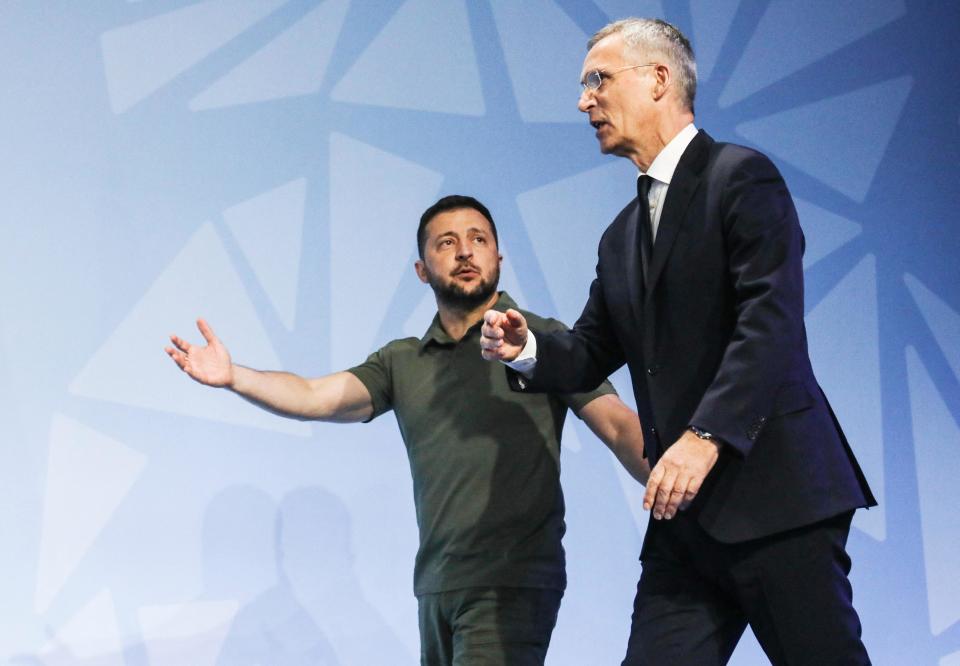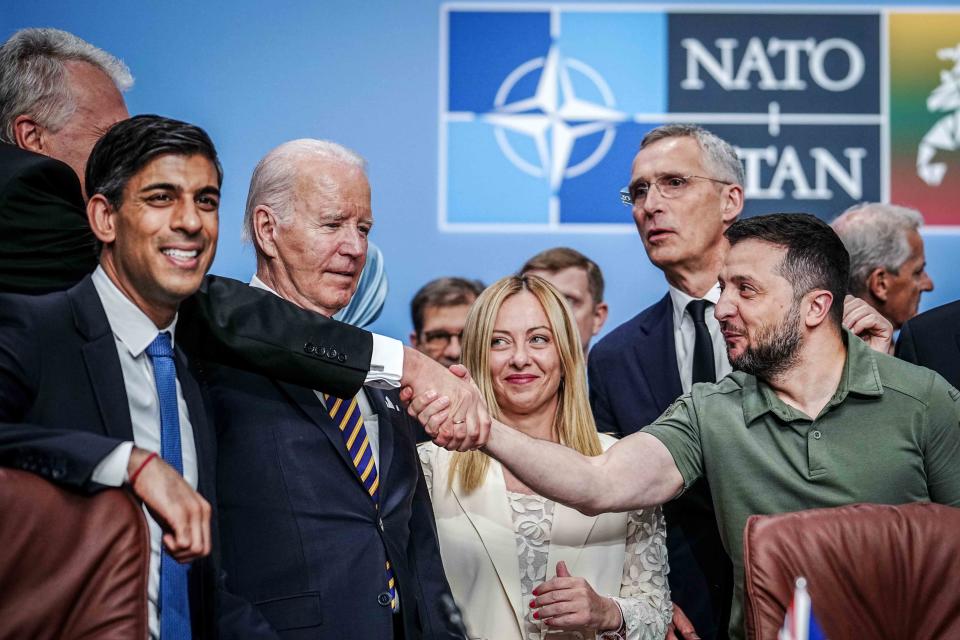NATO disputes spill into public view in wrangle over Ukraine
- Oops!Something went wrong.Please try again later.
- Oops!Something went wrong.Please try again later.
The world has caught a glimpse of the inner workings of Ukraine’s dealings with its Western backers, and like many a marriage, it’s complicated.
During a high-profile, two-day NATO summit in Lithuania, intense wrangling that diplomats generally prefer to keep behind closed doors instead spilled into public view, revealing a relationship between Kyiv and Western capitals that can be high-strung, emotionally fraught and occasionally messy.
Heading into the summit’s final day, the United States and its allies were mired in disagreement that highlighted fundamental divisions between the war-torn country and its Western partners. Russia, meanwhile, gloated from the sidelines.
By the end of the summit, Ukraine and its backers had done their best to paper over any discord, with President Joe Biden praising Ukraine’s “astounding” courage and Ukraine’s leader effusively thanking the U.S. for its support. Ukraine walked away from the summit with tangible wins in hand, including unprecedented long-term security commitments from the world’s leading democracies and a simplified path to future NATO admission.
Still, the brief eruption of frustration among allies that have sought to publicly portray themselves in lockstep was a window into the difficult task of holding the alliance together as the war in Ukraine surpasses the 500-day mark.
To hear NATO’s version of events, the summit in Lithuania displayed the alliance’s “unwavering solidarity” with Ukraine “in the heroic defence” of its people and Western values, according to its communique published Tuesday. It said NATO would extend an invite for Ukraine to join the 31-member defense organization, but only when all allies agreed and certain conditions were met.
Ukraine has shown a more pessimistic take on what has gone down — initially at least. It believes that by holding Europe’s eastern flank against Russia it has already done more than enough to be offered a concrete entry plan.
“When will the conditions be met? What are those conditions? Who has to formulate them?” Ukrainian Foreign Minister Dmytro Kuleba said in an interview with Radio Free Europe on Wednesday. He was echoing his president, Volodymyr Zelenskyy, who arrived in the Lithuanian capital, Vilnius, on Tuesday while fuming about NATO’s “strange wording about ‘conditions.’”
The main conclusions of #Vilnius are: there will be weapons, there will be support, there will be a sovereign and independent Ukraine. One day, #Ukraine will definitely join @NATO. Until then, let us remember: our lives and security are only in our hands. We thank our partners,…
— Михайло Подоляк (@Podolyak_M) July 12, 2023
Zelenskyy went on to deliver a barnstorming speech in downtown Vilnius on Tuesday, giving a clear warning that he wanted to see “a NATO that does not hesitate, that does not waste time and does not look over their backs at any aggressor” — referring to Western fears about escalating a war with nuclear-armed Russia.
Zelenskyy’s tone had changed Wednesday afternoon when he thanked Biden, saying that “you spend this money for our lives.” He also praised the U.S. for sending shipments of controversial cluster munitions.
During a warm public meeting with Zelenskyy, Biden acknowledged “frustration I can only imagine,” more than 15 years after NATO promised Kyiv a path to future membership.
But feelings ran deep among Ukrainians. Daria Kaleniuk, the executive director of the Anti-Corruption Action Center, a Kyiv-based nongovernmental organization that monitors graft in Ukraine, said the president’s strident tone merely reflected opinion back home. “Our allies should not be frustrated with his words because this is what Ukrainians on the ground feel,” Kaleniuk told NBC News.
The NATO summit comes at a crucial time for Ukraine, whose counteroffensive is going slower than expected, even while Russian President Vladimir Putin grapples with the fallout of a brief rebellion by Russia’s own mercenary forces.
NATO, or the North Atlantic Treaty Organization, was formed after World War II and is based on the principle that its members would all defend an ally under attack. NATO opened the door to Ukraine membership in 2008, but it never happened. Four years later, Russia annexed Crimea before launching a full-scale invasion last year.
Although his country has been given tens of billions of dollars in Western military aid, Zelenskyy says NATO membership is crucial not just to the defense of his land but to the protection of its European neighbors. But the U.S. and Germany, wary of risking a wider war with the Kremlin, have made it clear that a concrete timeline for membership is premature.

There was more promising news for Ukraine as the G7, an informal group of rich democracies, said as part of the summit Wednesday it would shore up and solidify its previously ad hoc military support for Kyiv into bilateral long-term security commitments. Andriy Yermak, Zelenskyy’s chief of staff, called this agreement an “important victory for Ukraine on the way to NATO.”
But membership of the alliance is the ultimate prize. And Zelenskyy knows Ukrainians are expecting him to return from Vilnius with something solid. Nearly 90% want to see their country join NATO, according to a recent poll by the Kyiv International Institute of Sociology. The president’s popularity has skyrocketed partly because of his image as someone who gets things done.
Taras Tarasiuk, a security analyst in Kyiv, told NBC News that he had “high expectations” of the summit but that in the end it gave Ukrainians “the feeling that we are alone, that we have to fight by ourselves.”
These tensions boiled over after Kaleniuk, the executive director of the Anti-Corruption Action Center, got into a heated exchange with U.S. national security adviser Jake Sullivan during a discussion at the Vilnius summit. “What should I tell my son? That President Biden and NATO didn’t invite Ukraine to NATO because he’s afraid of Russia?” she asked Sullivan on Wednesday.
He replied by praising her work but also saying that the American people “deserve a degree of gratitude” for supporting Ukraine.
Kaleniuk expressed this frustration in an interview with NBC News just hours earlier.
“It’s an insufficient and disappointing communique, which presents NATO’s weakness, not NATO’s strength,” she said about Tuesday's statement, describing it as “a green light for the Kremlin to keep nuclear blackmail going,” in reference to Putin’s threats against the West.
At the 2008 summit in Bucharest, Romania, there was not much detail on what NATO’s “open-door policy” meant for Ukraine. “We expected that yesterday there would be a clarification on where these doors are and how to get there,” Kaleniuk said — but this never came.

Russia, meanwhile, gloated from the sidelines.
Former Russian President Dmitry Medvedev mocked NATO’s lack of clarity on when Ukraine might join. “Most likely — it will never happen,” Medvedev, who is now deputy chairman of Russia’s Security Council, wrote on the messaging app Telegram. “That’s what realists in the alliance are afraid to say out loud.”
Using the taunting style typical of many Russian politicians and propagandists, Medvedev wrote that the communique was so vague because “the completely crazy West could not come up with anything else.”
The summit was “predictability of the highest level, to the point of idiocy,” he added.
This article was originally published on NBCNews.com

